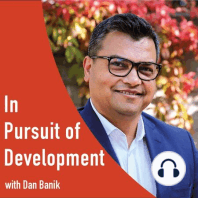62 min listen

Democracy, development and Covid response in Africa — Boniface Dulani
Democracy, development and Covid response in Africa — Boniface Dulani
ratings:
Length:
79 minutes
Released:
Jun 17, 2020
Format:
Podcast episode
Description
Malawi is my second home. Every year, for the past fifteen years, I have made numerous trips from Norway to this beautiful country in Southern Africa to conduct research and to teach at the University of Malawi’s Chancellor College. During this time, I have been privileged to strike up many friendships with Malawians from all walks of life. I miss my friends. With borders closed all over the world, I worry that I may not be able to return to this beautiful country for a very long time. My initial interest in Malawi was spurred by two Masters students of political science at the University of Oslo who were studying health policy and local perceptions of the impact of democracy in Malawi in 2004-2005. While supervising these students, I began to learn about a country that did not normally elicit much international attention. The more I read, the more intrigued I became. The narrative then, as is also often the case now, was of Malawi struggling to achieve economic growth and address poverty reduction while undergoing democratic consolidation. The social science literature on Malawi then was limited. And the few good books that offered nuanced analyses explaining Malawi’s underdevelopment highlighted a dysfunctional political system, pervasive corruption, and the general lack of trust in democratic institutions. Hence, many questioned the added value of democracy and whether hard fought democratic freedoms have provided citizens with improved livelihoods. Many of these issues remain as relevant today as they were fifteen years ago. I have tried to decode the “Malawi paradox” – i.e. despite peace, political stability and consistent support for democracy, most Malawians have not witnessed radical improvement in their living standards and the country continues to perform poorly on most development indicators. And high levels of corruption, administrative inefficiency and political inaction and the lack of foresightedness continue to dominate the development landscape. Malawi lags behind its neighbours, and hence the international development discourse is frequently characterised by the perception that “there are developing countries, and then there is Malawi”. Such statements imply a sense of hopelessness about the country’s development trajectory. We address many of these issues in a book that I edited with Professor Blessings Chinsinga in 2016 entitled Political Transition and Inclusive Development in Malawi: The Democratic Dividend (open access). In this book, we concluded that democracy does not necessarily always foster or guarantee development when the desire to win the support of the electorate results in the adoption of populist policies. Indeed, although the overarching policy goals of the various governments in Malawi since 1994 have been poverty alleviation, the empirical evidence suggests that the impact of democracy on poverty reduction and socio-economic development has been negligible. Will the upcoming elections usher in a new age for Malawi? Only time will tell. My guest in this episode is Dr. Boniface Dulani, who studied at York and Sussex universities in the UK and has a doctorate in political science from Michigan State University in the United States. He is the Director of Survey at Afrobarometer – a non-partisan, pan-African research institution conducting public attitude surveys on democracy, governance, the economy and society in over 30 countries on the African continent. Dr. Dulani is senior lecturer at the Department of Political and Administrative Studies at Chancellor College, University of Malawi.
Released:
Jun 17, 2020
Format:
Podcast episode
Titles in the series (100)
China’s Belt and Road Initiative and infrastructure development in Africa — Gyude Moore: Dan Banik speaks with Gyude Moore, Liberia's former minister of public works, on a range of issues including Ebola response and infrastructure development on the African continent. by In Pursuit of Development